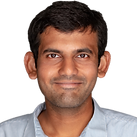

Praneeth Reddy Sudalagunta
Data Scientist. Cancer Researcher. Aerospace Engineer.
About Me:
I am a research instructor in the department of cancer physiology at H. Lee Moffitt Cancer Center. I received my doctoral degree from Virginia Tech in aerospace engineering, on the topic “Control-Oriented Modeling of an Air-breathing Hypersonic Vehicle under Extreme Aero-thermal Loads ”. I have a masters degree from Indian Institute of Technology Kanpur in flight mechanics from the department of aerospace engineering with a focus on "Optimal Aero Assisted Orbital Transfer with Predictive Time-linear Control and Adaptation".
Over the past decade of my academic life, I’ve gained exposure in the fields of computational and data sciences through the lens of electrical engineering as an undergraduate student, aerospace engineering as a graduate student, and biomedical sciences as an applied postdoctoral fellow and research scientist. As diverse as these fields maybe, they rely on using computational methods and real-world data to deepen our understanding of naturally occurring phenomena. This diverse academic background has helped me hone my skills in scientific problem solving and developing novel methodological approaches to solve complex problems in cancer research. In the process, I hope to contribute to improve the quality of human life through research.
